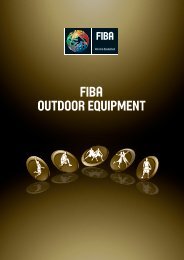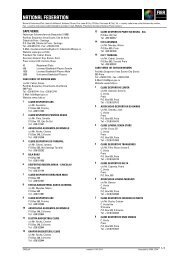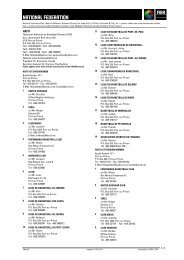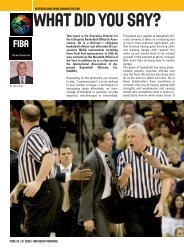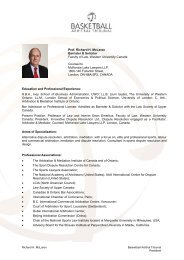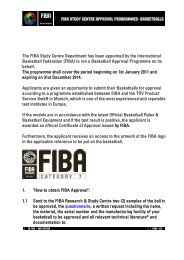brazıl / brezilya - FIBA.com
brazıl / brezilya - FIBA.com
brazıl / brezilya - FIBA.com
Create successful ePaper yourself
Turn your PDF publications into a flip-book with our unique Google optimized e-Paper software.
<strong>FIBA</strong> WORLD CHAMPIONSHIP HISTORY<br />
The <strong>FIBA</strong> World Championship is the biggest international basketball <strong>com</strong>petition<br />
in the world.<br />
The inaugural edition of the tournament took place in 1950 in Argentina and it<br />
has since been held 15 times.<br />
Yugoslavia were crowned world champions on five occasions while the Soviet<br />
Union won the tournament three times. Spain are the reigning champions.<br />
The United States of America, gold medal winners in 13 of 16 Olympic Games<br />
basketball tournaments, have only won the <strong>FIBA</strong> World Championship in three<br />
of their 15 attempts.<br />
Here is a look back at the four most recent <strong>FIBA</strong> World Championships.<br />
2006 – JAPAN<br />
Spain reigned supreme at the 2006 <strong>FIBA</strong> World Championship in Japan in what<br />
was then the biggest and most <strong>com</strong>petitive international basketball event. With<br />
the field increased from 16 to 24 teams, six European sides reached the last<br />
eight with Spain ultimately triumphing over Greece to capture the gold medal.<br />
The other four continents had memorable moments of their own over the<br />
course of the tournament. African giants Angola and Nigeria advanced to the<br />
knockout stages, where the latter fell to Dirk Nowitzky’s Germany by just one<br />
point. Oceania’s two representatives, Australia and New Zealand, also made it to<br />
through to the last 16, while Yao Ming led then <strong>FIBA</strong> Asia champions China into<br />
the Eight-Finals and the Americas were represented by the USA and Argentina<br />
in the Semi-Finals.<br />
As the tournament progressed towards a thrilling climax, fans were treated to<br />
two breathtaking semi-finals. The USA, Greece, Argentina and Spain all made<br />
it to the last four with undefeated records and each team expected nothing less<br />
than to reach the Final.<br />
In the first semi-final, Greece came from behind to beat the USA 101-95. The<br />
Greeks trailed by 12 early on, but thanks to the passing of Theo Papaloukas<br />
and the power of Sofoklis Shortsianitis inside, they fought back to lead 45-41<br />
at halftime and went on to win the game, leading fans to pour into the streets<br />
of Athens.<br />
In the second semi-final, 2004 Olympic champions Argentina lost out to Spain,<br />
75-74. Andres Nocioni missed an open three-pointer in the final seconds and the<br />
Spaniards were deserving winners. The triumph came at a high price though as<br />
star player Pau Gasol broke his foot and missed the decider.<br />
However, he was not needed as Spain triumphed 70-47 over Greece to win their<br />
first ever World Championship. The USA secured bronze after getting the better<br />
of Argentina 96-81.<br />
2002 – USA<br />
The 2002 <strong>FIBA</strong> World Championship will go down in history as the first to<br />
take place in the homeland of basketball and one of the most exciting <strong>FIBA</strong><br />
<strong>com</strong>petitions ever.<br />
Before the start of the tournament, most experts agreed that more than half of<br />
the 16 teams could make it to the Semi-Finals. However, the USA – gold medal<br />
winners at the 2000 Sydney Olympics – were still heavy favourites, if anything<br />
because they were playing on home soil.<br />
The hosts though lost 87-80 against Argentina in the Eighth-Finals and that<br />
meant they would have to face reigning <strong>FIBA</strong> World Champions Yugoslavia in<br />
the Quarter-Finals. After losing that game 81-78, the USA were out of the running<br />
for medals for the first time since using NBA players.<br />
In the Final, Yugoslavia successfully defended their title by outlasting Argentina<br />
84-77 after overtime in a thrilling contest. Germany dispatched New Zealand 117-<br />
94 to secure a bronze, and their first medal in the <strong>FIBA</strong> World Championship.<br />
1998 – GREECE<br />
The best players in the USA refused to participate in this edition of the <strong>FIBA</strong><br />
World Championship because of the NBA lock-out.<br />
While that was a blow to the tournament’s success and popularity, it also resulted<br />
in there never being so many candidates for the medals, especially since<br />
Yugoslavia had returned to the <strong>com</strong>petition. From this point on though, their team<br />
would be made up entirely of players from Serbia and Montenegro.<br />
The games involving potential medal winners were most often evenly-matched<br />
194<br />
and gave rise to several surprises. For example, Lithuania edged out the USA 84-<br />
82 behind 29 points from Arturas Karnishovas while Yugoslavia needed overtime<br />
to see off Russia 82-74 and Spain just about squeezed past Argentina 68-67.<br />
The USA got the upper hand over Italy 80-77 to reach the Semi-Finals but<br />
relinquished their title as World Champions after falling 66-64 against a Russian<br />
team led by the excellent Sergei Babkov who broke out for 30 points.<br />
In the other semi-final, Yugoslavia had problems dealing with Greece’s height<br />
advantage early on, but Dejan Bodiroga and Zeljko Rebraca came through in the<br />
second half for a <strong>com</strong>e-from-behind 78-73 win.<br />
The Yugoslavs confirmed their superiority in Europe by beating Russia 64-62<br />
in the Final thanks once again to the pair of Bodiroga and Rebraca, who made<br />
it possible to for the country to win a fourth world championship despite the<br />
absence of Predrag Danilovic, Vlade Divac and Zoran Savic.<br />
1994 – CANADA<br />
This <strong>FIBA</strong> World Championship was like no other for several reasons. Firstly<br />
because it was played in Toronto’s SkyDome – usually home to the Toronto Blue<br />
Jays, the city’s professional baseball team – which had a capacity of up to 70,000<br />
people. The stadium though was converted for the occasion and registered a<br />
crowd of 32,616 spectators on the final day – a <strong>FIBA</strong> World Championship<br />
record.<br />
The tournament was also different through the presence of a USA team that<br />
boasted NBA superstars Shaquille O’Neal, Alonzo Mourning, Dominique Wilkins<br />
and Reggie Miller and as such was deserving of its title of “Dream Team II”. They<br />
justified that title by following in the footsteps of “Dream Team I” which, two years<br />
earlier, had walked away with the gold medal at the Barcelona Olympics.<br />
The wind of change had blown through the participating teams. The USSR,<br />
which had been dismantled, made way for Russia while Yugoslavia, submitted to<br />
a UN embargo, was not admitted to Toronto. Croatia were appearing in a <strong>FIBA</strong><br />
World Championship event under their own flag for the first time.<br />
The USA proved their superiority in the Final by beating Russia 137-91.<br />
There were, however, mitigating circumstances for the Russians. On the previous<br />
day, they had to battle hard against a Croatian side led by Toni Kukoc and Dino<br />
Radja, eventually outlasting them 66-64 to book their place in the Final.<br />
In the definitive fight for the title, the exploits of Babkov, Mikhail Mikhailov and<br />
Sergei Bazarevich were not enough to prevent O’Neal from enforcing his own<br />
law under the basket at both ends of the court.<br />
Europe managed to place three teams behind the invincible “Dream Team<br />
II”. Russia took silver, Croatia claimed a bronze and Greece enjoyed its best<br />
championship to date.<br />
A history of all past editions of the <strong>FIBA</strong> World<br />
Championship can be found on archive.fiba.<strong>com</strong>.




